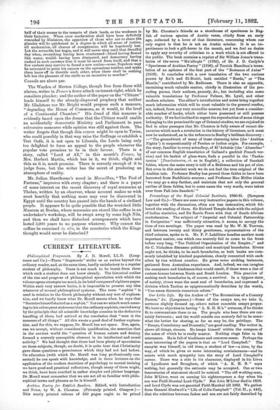CURRENT LITERATURE.
Philosophical Fragments. By J. D. Morell, LL.D. (Long- mans and Co.)—These "fragments" strike us as rather beyond the ordinary reader, and, at the same time, hardly satisfactory to a regular student of philosophy. There is not much to be learnt from them which such a student does not know already. The historical outline of the rise and progress of philosophical speculation with which the volume opens attempts too much, in its brief compass of eighteen pages. Within such very narrow limits, it is impossible to present any idea whatever of several philosophical systems. The term " sophist " is used in relation to the Greek philosophy without any sort of explana- tion, and we hardly know what Dr. Morell means when he says that " Socrates himself started as a sophist." Nor can we attach much mean- ing to his subsequent statement that the ordinary sophists, carried away by the principle that all scientific knowledge consists in the deductive handling of ideas, had arrived at the conclusion that " man is the measure of all things." All this wants a good deal of further explana- tion, and for this, we suppose, Dr. Morell has not space. Nor, again, can we accept, without considerable qualification, the assertion that in the ancient world the "question of human nature and destiny formed a scarcely perceptible element in its intellectual and moral activity." We bad thought that there had been plenty of speculation on these subjects, though, no doubt, it is quite true that Christianity gave these questions a prominence which they had not had before. On education (with which Dr. Morell was long professionally con- nected) he can speak with knowledge, and in three lectures on the application of the modern doctrines of psychology to mental training we have good and practical reflections, though many of them might, we think, have been couched in rather simpler and plainer language. Dr. Morell must remember that we are not all so familiar with philo- sophical terms and phrases as he is himself.














































 Previous page
Previous page